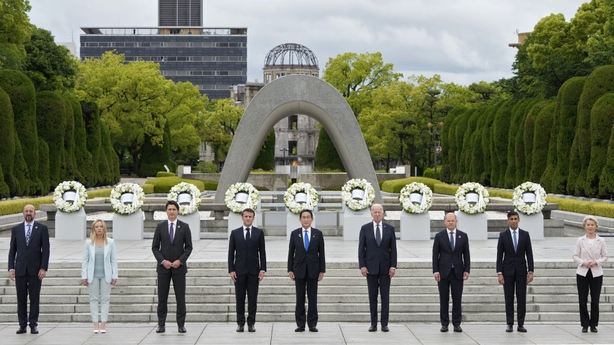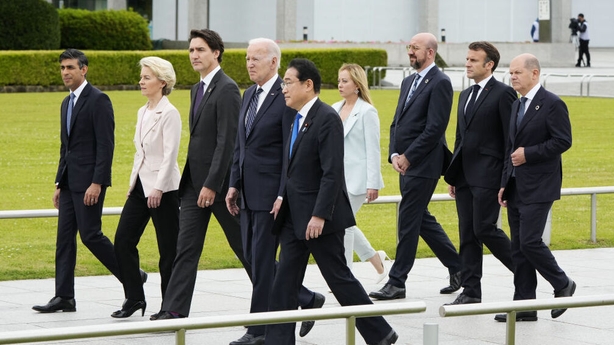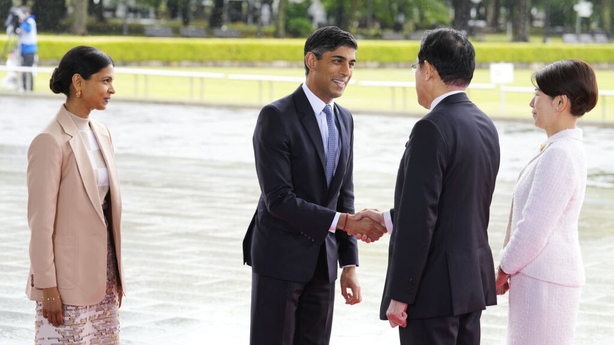US President Joe Biden has told G7 leaders that the United States will support providing advanced warplanes including F-16s to Ukraine and will back efforts to train Kyiv's pilots, a senior White House official has said.
The US move signals a major breakthrough for Kyiv, which has repeatedly - and until recently unsuccessfully - pushed its Western supporters to agree to provide high-tech jets as it fights to fend off Russia's invasion.
Ukrainian President Volodymyr Zelensky - who is set to meet Mr Biden during the G7 summit in Japan - hailed the move as a "historic decision," adding that he looked forward to "discussing the practical implementation" of the plan in Hiroshima.
Mr Biden said the United States "will support a joint effort with our allies and partners to train Ukrainian pilots on fourth-generation fighter aircraft, including F-16s, to further strengthen and improve the capabilities of the Ukrainian Air Force," according to the official.
"As the training takes place over the coming months, our coalition of countries participating in this effort will decide when to actually provide jets, how many we will provide, and who will provide them."
The UK, Belgium, and the Netherlands welcomed the decision.
"The UK will work together with the USA and the Netherlands, Belgium and Denmark to get Ukraine the combat air capability it needs," British Prime Minister Rishi Sunak tweeted, adding: "We stand united."
Denmark's acting defence minister Troels Lund Poulsen said it "will now be able to move forward for a collective contribution to train Ukrainian pilots to fly F-16s."
Momentum has been building for providing high-tech warplanes to Ukraine, but US support is key, as it legally has to approve the re-export of equipment purchased by allies, including F-16 jets.
Earlier this week, Mr Sunak and Dutch Prime Minister Mark Rutte pledged to build an "international coalition" to provide fighter jet support for Ukraine.
After visiting Mr Sunak at his Chequers country estate outside London on Monday, Mr Zelensky said he was "very positive" about creating a "jets coalition."
Mr Sunak said on Monday that the UK was preparing to open a flight school to train Ukrainian pilots, and French President Emmanuel Macron also offered to do so - but ruled out sending warplanes to Kyiv.

It all comes after leaders of the world's richest democracies agreed to stiffen sanctions against Russia and pledged financial support for Ukraine.
The Group of Seven leaders are also expected to address growing tension between their economies and China during their summit that runs until Sunday.
Officials said Mr Zelensky would attend in person over the weekend.
The leaders said in a joint statement that existing measures against Russia would be broadened and any exports that could help it in its 15-month war against Ukraine would be restricted across the G7 countries.
"This includes exports of industrial machinery, tools, and other technology that Russia uses to rebuild its war machine," they said in a joint statement, adding that efforts would continue to restrict Russian revenues from its trade in metals and diamonds.

Amid evidence that existing sanctions were being weakened by circumvention, they said the group was "engaging" with countries through which any restricted G7 goods, services or technology could transit through to Russia.
"We note and encourage commitments made by these countries to ensure our measures are not circumvented and have the intended effect," they said, without naming any territories.
Breakdowns of German trade data show that its exports to countries bordering Russia have risen sharply, fuelling concerns about the re-exportation of goods from those neighbouring states.
The group of rich democracies reaffirmed their condemnation of what they called Russia's aggression and promised further support for Ukraine, in terms of military help and financial aid for its war-shattered economy this year and next.
China's rapidly growing nuclear arsenal is also a "concern to global and regional stability", the G7 leaders said following talks on nuclear disarmament.

"China's accelerating build-up of its nuclear arsenal without transparency nor meaningful dialogue poses a concern to global and regional stability," the group said in a statement that also condemned Russia's "irresponsible nuclear rhetoric".
The members of the G7 - the United States, Japan, Germany, Britain, France, Canada and Italy - are also expected to debate strategy on the Ukraine conflict that shows no sign of easing.
Japanese Prime Minister Fumio Kishida, who represents Hiroshima in Japan's lower house of parliament, said he chose the city for the summit to focus attention on arms control.
Hiroshima, and another Japanese city, Nagasaki, were destroyed by US nuclear attacks 78 years ago that ended World War II.
Having emerged as the world's richest nations after World War II, the G7 democracies have become increasingly challenged by an ascendant China and unpredictable Russia.

